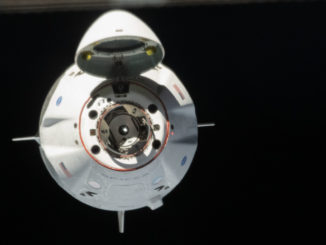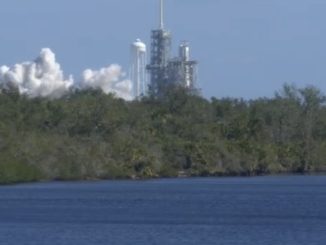
Update 9:31 p.m. EST: SpaceX adjusted the presumed liftoff time.
SpaceX is wasting no time in kicking off what it plans to be a historically busy year for orbital launches. The company launched its workhorse Falcon 9 rocket on a Starlink satellite mission Tuesday night.
Liftoff occurred at 7:44 p.m. PST (10:44 p.m. EST, 0344 UTC) from Space Launch Complex 4 East (SLC-4E) at Vandenberg Space Force Base in California. Among the 21 Starlink satellites launching Tuesday evening were the first six that will feature direct-to-cell capabilities.
This launch was originally planned for mid-December, but SpaceX ran into undisclosed issues in the run-up to launch and had to scrub the mission.
In a statement, SpaceX said that adding DTC will “enable mobile network operators around the world to provide seamless global access to texting, calling and browsing… on land, lakes or coastal waters.”
During and August 2022 event featuring SpaceX founder Elon Musk and T-Mobile CEO and President Mike Sievert, Musk called the new addition “a massive game changer” that would help eliminated dead zones across the globe.
“This really is a big deal,” Musk said during the presentation. “Even if an entire region or country lost connectivity because of a severe hurricane or floods or fires or tornados, earthquakes… even if all the cell towers were taken out, your phone would still work.”

According to a Nov. 30, 2023, email sent to Kathyrn Medley, the acting division chief of the Federal Communication’s (FCC) Satellite Licensing Division, SpaceX anticipates launching “approximately 840 direct-to-cell capable satellites over the next 6 months, with additional launches continuing after that period.”
Jameson Dempsey, SpaceX’s director of satellite policy and the author of the email, wrote that the planned and future launches would “ensure that we can launch a critical mass of satellites in time to deliver commercial service later in 2024.”
“As such, while we understand that the Commission may limit our experimental authority to the satellites we expect to launch and testing the next 6 months, we request that the launch license include authority for all 7500 satellites in our direct-to-cell modification application,” Dempsey wrote.
The six @Starlink satellites on this mission with Direct to Cell capability will further global connectivity and help to eliminate dead zones → https://t.co/FgiJ7LOYdK pic.twitter.com/zFy7SrpsYs
— SpaceX (@SpaceX) January 3, 2024
Sievert noted during the August 2022 event that the upcoming service in the U.S. would use the existing T-Mobile mid-band PCS spectrum.
“That allows us to then dedicate that, working together, to the constellation that Starlink operates so that we are seeing those satellites from every corner of the country,” Sievert said. “If you have a clear view of the sky, our vision is you’re connected.”
“Your phone doesn’t know it’s connecting to space. It will scan for its home network, it’ll scan for terrestrial roaming partners as well,” Sievert added. “And if it fails to see those things, it will scan again and it will connect to the authorized connection from the satellite and it’ll think it’s connected to a cell tower because that phone is using industry standard technology communication protocols and it has the spectrum already built in. At least, the vast majority of phones in circulation today do.”
The Falcon 9 rocket supporting Tuesday’s launch features first stage booster, tail number B1082, which will launch for the first time on this mission. About 8.5 minutes after liftoff, the booster will land on the droneship, ‘Of Course I Still Love You.’



